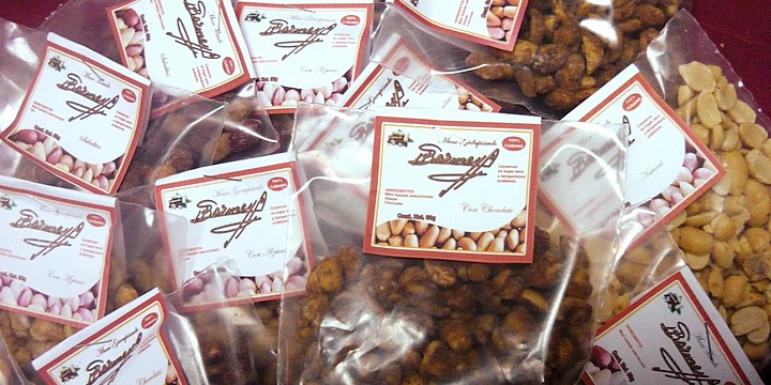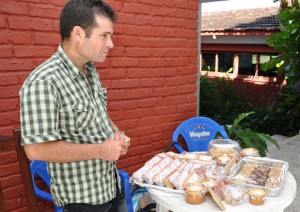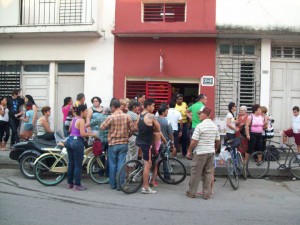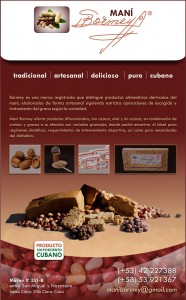
Bormey peanuts: Anatomy of a new enterprise in Cuba
VILLA CLARA, Cuba — “What I have done is to start the business, use professional tools and take advantage of the opportunities presented by ‘the opening’ and the institutions, in order to develop an enterprise,” explains Orelvis Bormey Torres.
He is an industrial engineer with a Master’s degree. A man just over 30, he has created a brand (by now well known) and a prosperous business in Santa Clara, using peanuts as the basic product.

About 300 clients show up daily at the “Bormey House of Peanuts,” where he sells 21 types of turrones [nougat, fudge], five varieties of panetelas [a form of pound cake] and about 10 varieties of snacks [small bags of peanuts.) Ten years ago, that was unthinkable.
“I always saw my grandparents and my father growing peanuts in Quemado de Güines, where I was born,” he says. “They also processed them into nougat.”
After his second year at Las Villas Central University (UCLV), Orelvis turned that family tradition into a source of financial income. Two years later, in 2004, he himself began to make turrones.
For about eight years, he worked with only one kind of dough and a single style of turrón. After he opened his House of Peanuts in December 2012, he worked with four kinds of dough (with sugar, without sugar, with honey and in Alicante style) and nearly 10 varieties of products.
[Translator’s Note: Turrones originated in the Spanish region of Alicante in the 15th Century.]
“After I graduated, I kept raising peanuts, even though I was working for the State. I made the bars and took them once a week to the homes of clients I knew. My clientele later expanded. Of course, I never announced that I was selling peanuts because at the time no licenses were issued [to entrepreneurs]. Selling turrones was illegal, even though the sugar came from the store and the peanuts from my father’s farm.”
While selling turrones “on the sly,” between 2005 and 2012, the young engineer was head of the purchasing department at the university where he studied and supervised product quality and human resources in companies like Caracol, a construction firm in Caibarién, and the Villa Clara Graphics Enterprise. The seven years of experience he acquired he now utilizes for his own business.
“I devoted the entire year of 2013 to putting together the manufacture and sale of the products that distinguish and represent my brand. For the rest of 2014 and the coming years, I will organize the procurement of raw materials. I didn’t ignore this aspect of the business but first I needed to set up a portfolio of products with stability, with a consolidated image.”
 From itinerant vendor to The Bormey House of Peanuts
From itinerant vendor to The Bormey House of Peanuts
It all started with the brand. “I always liked the way my father signed his name and — beyond the Bormey family pride — I tried to mollify the old man, who didn’t want me to quit my job. I asked him to sign his name, we designed the logo, and came in June to Havana to register the brand at the Cuban Trademarks Office (OCPI). At that time, I owed about 20,000 or 25,000 pesos.” [$1,000-1,250]
By December 2012, the business had become serious enough for Orelvis to launch his House of Peanuts, which today has eight salaried workers (five factory workers and three salespeople) and retains the services of a designer and an attorney and has contractual relations with several state-owned companies.
After opening “the little house,” the Bormeys began to label each product in a different fashion, according to the rules.
“We followed the procedures dictated by Public Health for the handling of foodstuffs, the recommendations of the Food Industries Department and the counsel of the UCLV’s School of Agriculture regarding the grain that we buy. Their latest suggestion was that we should say in our labels that our products have no food preservatives.”
“We have been going ahead without finding any problems, without plans for improvement, but considering where the deficiencies are and taking steps to eliminate them.”
The price structure of Grupo Bormey is very local. “We are in Villa Clara, whose prices do not compare with those in Havana. That’s why we set them using the production cost and adding a margin that results in a sales price — in national pesos [CUP] — that is accessible to our clients. Comparatively speaking, our prices are above the average for Santa Clara.”
Fifteen months after the factory started operations, the labels that once said “Made by Orelvis Bormey” now say “Made by the Bormey Group.” To Orelvis, to keep his business going, he needs two basic premises: a relationship with his workers and a relationship with state-owned institutions, companies and suppliers.
“We are not a cooperative or a state-run business, but we’re not just Orelvis. We are a group of people intent on transforming the image of the Cuban peanut, from a paper cucurucho [funnel] to a portfolio of products. That way, each worker receives the credit he or she deserves and feels more committed” to the job.
Referring to the company’s expansion, “something that opened the doors for us was the creation of an account at the Bank of Credit and Services of Santa Clara,” he says. This enabled the firm to sign contracts with state-run companies that print the labels, promotions and bags or sell cups, cake boxes and storage labels.
Last year, the Chamber of Commerce invited the Bormey House of Peanuts to participate in the Havana International Fair (FIHAV-2013).
To Orelvis and his group of peanut vendors (who do not sell peanut bags on the street), it is vital to have a good chain of suppliers. “They are the main link to minimize costs,” he says.
Some people buy peanuts from the farmers, store it and then, after the harvest is over, sell it at a price higher than normal. Bromey does not always buy from intermediaries but does depend on them for part of the year. He has invested about 10,000 CUP [$500] in storage containers alone.
“In order to retain the quality of the product, improve its presentation and maintain its variety to reach the most buyers, we need to organize the flow of raw materials. I have to deal with the farmers to shorten the [production] chain, and increase their profits and mine. Not to mention the intermediaries, who are necessary.”
Doing business
“I turned to peanuts because you can process them and preserve them without the need for special conditions. Also, the potential for its cultivation in Cuba is great, because of the propitious climate, the type of earth, the availability of seeds and professional support, because [peanut farming] can eliminate imports and generate jobs.”
Everything has to work just right, starting from the furrows. “A good harvest means that, once the peanuts have been extracted, they’re left to dry on the field, then harvested, separated from the plant, sun dried to remove the moisture and kill any fungus, and stored away. When ready to process, a machine shells them, removes the skin, blows it away. Then I grind them and mix them with sugar. I do this by myself, because the distinction of the Bormey products depends on that.”
Orelvis has been doing this in the same supply house for the past 10 years. “My supplier has two mills, one for the peanuts, the other for the sugar, and a mixer that other manufacturers use. But I give him the most business. So, once a week I process the peanuts we’re going to use.”
Wouldn’t it be better to own those machines and not depend on anyone?
“No. The machines are not expensive but I would have to find a space for them, transportation for the peanuts, and all that to use [the mills] once a week. Where I do it now, it’s strategic for me. The man has a license and guarantees the necessary hygienic conditions. His capacity for processing suits my needs. It works and I don’t have to start a cooperative or change my routine.”
Later, in another supply house, there is space for the storage of dough and the manufacture of the turrones, ice cream, panetelas and other products.
“Now that we’re in the business, we’re going to use the tools we learned in our training and our own experience to keep making a quality product that is recognized by our clientele. We are proud of our product and our brand.”


